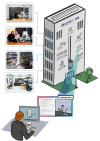Differences
This shows you the differences between two versions of the page.
| Both sides previous revisionPrevious revision | Last revisionBoth sides next revision |
| research:cogwatch [2014/02/22 21:30] – [Consortium] tenorth | research:cogwatch [2014/03/05 11:21] – yfang |
|---|
| =====CogWatch===== | ======CogWatch====== |
| //Cognitive rehabilitation of apraxia and action disorganisation syndrome// | //Cognitive Rehabilitation of Apraxia and Action Disorganisation Syndrome// |
| |
| People who have had a stroke may experience neurological difficulties such as apraxia and action disorganisation syndrome (AADS). This can result in cognitive deficits which make it hard for the person to undertake every day tasks which they were previously able to perform automatically. Such difficulties can be so severe as to prevent people from leading independent lives. At present, most common IT systems for stroke rehabilitation focus on treating the physiological symptoms of stroke, such as muscle weakness, and are not appropriate for helping with cognitive impairments. In addition, they are typically based on robot and/or virtual reality platforms which are expensive and not always suitable for use at home. | The goal of the CogWatch project is to enhance rehabilitation of patients who suffer from apraxia or action disorganisation syndrome (AADS) after stroke by providing tools that are part of a personalized home rehabilitation system. Many stroke patients suffer cognitive deficits that impair their abilities to carry out activities of daily living. |
| |
| The aim of this project is to develop a new Personal Healthcare System (PHS) for cognitive rehabilitation following stroke which will be be affordable, customisable and capable of delivering continuous cognitive rehabilitation at home, when it is needed. The proposed system plans to exploit intelligent tools and objects, portable and wearable devices as well as ambient systems to provide personalised cognitive rehabilitation at home for stroke patients with AADS symptoms. | At the present, most common IT systems for stroke rehabilitation focus on physiological symptoms, such as muscle weakness, but are not appropriate for treating cognitive impairments. Moreover, they are typically based on robot and/or virtual reality platforms that are expensive and are not always suitable for use at home. Cogwatch will develop intelligent tools and objects, portable and wearable devices, and ambient systems for a new Personal Healthcare System (PHS), which will provide personalized cognitive rehabilitation for stroke patients within their home environment. |
| | |
| | For more information and news, visit www.cogwatch.eu |
| | |
| | Partners: |
| | | [[http://www.birmingham.ac.uk/schools/psychology/index.aspx/|{{:projects:cogwatch:partners:uob.png?200}}]] | [[http://www.bmt.org/|{{:projects:cogwatch:partners:bmt-logo.png?200}}]] | [[http://www.headwise.org.uk/|{{:projects:cogwatch:partners:headwise.png?200}}]] | |
| | | [[http://www.rgb-medical.com/|{{:projects:cogwatch:partners:rgb.png?200}}]] | [[http://www.tzi.de/|{{:research:unibremen.png?200}}]] | [[http://www.stroke.org.uk/|{{:projects:cogwatch:partners:stroke.png?200}}]] | |
| | | [[http://www.upm.es/internacional|{{:projects:cogwatch:partners:upm.png?100}}]] | [[http://www.bluebotics.com/|{{:projects:sherpa:partners:bb-logo.png?200}}]] | [[http://www.aslatech.com/|{{:projects:sherpa:partners:at-logo.png?100}}]] | |
| | | [[http://www.cai.it/|{{:projects:sherpa:partners:cai-logo.png?100}}]] | |
| |
| |
Prof. Dr. hc. Michael Beetz PhD
Head of Institute
Contact via
Andrea Cowley
assistant to Prof. Beetz
ai-office@cs.uni-bremen.de
Discover our VRB for innovative and interactive research

Memberships and associations:



Social Media:














